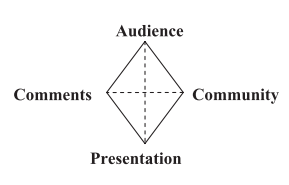Introduction
After using blogs to reflect on my studies over the last three months, I feel like it's time to reflect on the actual act of blogging itself. I have used the blog in a variety of ways; to summarise and consolidate knowledge from set texts, to discuss and express my opinions, to store useful hyper-links and videos, and to develop my transmedia skills. But why didn't I just write it all down in a Word document?
The affordances of blogs
First of all, the fact that a blog can be public means that it can potentially be read by anyone. Exposing your writing to the pubic might seem anxiety inducing at first, but it ultimately ensures that you take your work more seriously. This means that you are more likely to avoid plagiarism and create and present your own knowledge in an original and innovative way. In reality you might only get a couple of people reading your blog so although it's public you are kind of writing to yourself most of the time. This leads you to take on a more personal style in your writing, it's almost like thinking aloud for me.
Community
In this part of the creative writing course we have been encouraged to comment on each other's posts. This is a new experience for me and I'm interested to see if any kind of discussion will develop in the comments of my blog and what effect this will have on my writing. Will our blog posts start to address issues brought up in the comments of another blog? Or will we start hyperlinking to other student's blog posts? I suppose what I'm really asking is can blogs facilitate and sustain a community of inquiry in the ways wikis can? Isn't a blog too introspective and personal in nature to for this purpose?
A framework for blogging
The key points highlighted in bold above link nicely to the four factors noted by Kerawalla, L. et al. (2009, pp.33-34) from research at the Open University into blogging for students studying in higher education. See the diagram below.
Kerawalla, L. et al. (2009, p.34)
Blogs and PLEs
I have started experimenting with wikis and I am happy with the results so far but there is one thing that is bothering me about their use. A wiki if set up by the teacher can potentially have all the limitations of a VLE when it comes to life-long learning. What happens when the course finishes? For me, the most likely outcome will be that the learners abandon the space and all the content they have created, just like Moodle. Blogs, however, would remain in the hands of the blogger and dovetail into a PLE. It would therefore seem that blogs are better at facilitating ownership and identity creation than wikis could ever hope to be. That said you do need a central hub to initially bring all these blogs together while the learners get to know each other and the wiki could serve this transitory purpose.
Blog as part of a PLE
Blogs and Wikis
My plan for my new group of learners this week is to combine the affordances of these two web 2.0 tools. The wiki will serve as a highly flexible VLE to store links to the blogs amongst other things and the blogs will be used for weekly writing tasks or reflection. When these technologies are fully integrated into the course I will be in a perfect position to help my learners develop their creative writing skills via the blogosphere.
References
Kerawalla, L., Minocha, S., Kirkup, G., & Conole, G. (2009). An empirically grounded framework to guide blogging in higher education. Journal Of Computer Assisted Learning, 25(1), 31–42.
Images
Blog in a PLE
http://www.z3live.com/marketing/content-marketing/blogs/
Viewed 15/02/16


No comments:
Post a Comment